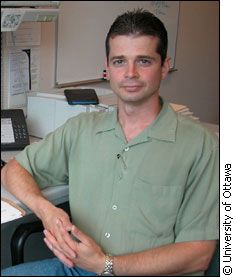| Working
on thin ice
By Lindsay Forcellini
 |
| Robert Ben, a professor
at the University of Ottawa, is currently working
on developing an analog that will inhibit the growth
of ice. |
OTTAWA — In
his synthetic organic chemistry lab at the University
of Ottawa, researcher Robert Ben is working on thin
ice. And it’s getting thinner.
Ben and his team of researchers
are studying antifreeze glycoproteins, a novel class
of compounds that possess the ability to inhibit the
growth of ice.
These compounds can be found in
various fish, plants, amphibians, and insects. Ben’s
research focuses on the antifreeze derived from fish.The
long-term goal of this research is to find new and effective
ways to preserve cells, tissues, and ultimately, organs.
When an organ is frozen, explained
Ben, ice crystals develop within the tissues, leaving
holes in the cells once the organ is thawed. It is these
holes that are problematic and very damaging to the
organ.
"Our research is important
largely because . . . there is only a 10 to 16 hour
window for donor organs, so lots of them aren’t
donated at all," Ben said. "If we could freeze
organs, we could alleviate the shortage, and ultimately,
less people would die."
Ben’s research is based on
analogs of a compound that is naturally occurring in
fish.
| "If we could
freeze organs, we could alleviate the shortage,
and ultimately, less people would die." |
An analog has a molecular structure
very similar to the native compound but with distinct
differences. Often the analog is a simplified version,
noted Ben, and it is created using medicinal chemistry
to enhance the stability of the compound.
"Say you have a car and you
don’t know how it runs. You can take the door
off and it will still run, so you deduce that the door
isn’t important. But if you go under the hood
and remove the spark plugs, the engine won’t start,"
Ben said."Medicinal chemistry
involves making small changes to the analog to monitor
its functional activity to deduce what is important."
Once the analog is structured,
the researchers make it in the lab and then test it.
Ben said testing is performed using mammalian cell lines,
or cell cultures because if the compound does not work
on the culture, it will not work on the organ. The testing
process takes about one week per analog.
"We’ve probably made
about 60 analogs to date, and it’s still a learning
curve. It really is an ongoing process," noted
Ben.
The researchers are at a crucial
point in the project, having discovered that the compound
has other interesting biological properties.
"We discovered, by accident
really, that it has applications in the treatment of
stroke and spinal cord injuries,"explained Ben.
"So in the next year, we will be exploring these
unique properties."
The team will also be patenting
its research in the coming months, but Ben said his
interest is more in the complexity of the science and
finding out how the compound actually works rather than
patenting the theory just to make money.
Ben’s research is also unique
in itself. While there are a handful of labs around
the world that are working with antifreeze compounds,
Ben proudly stated that his lab is the only one in the
world to create a new analog based on a natural structure.
"We’ve gone one step
further," he says. "It buys us a little niche."
Having obtained an undergraduate
degree in bio and organic chemistry at Laurentian University,
Ben, who was born in Sault St. Marie, Ontario, later
completed his Ph. D. studies in synthetic organic chemistry
at the University of Ottawa. His post-doctoral work
was done at the University of Toronto where he was later
hired by the National Research Council. Ben later worked
in the United States for five years before moving his
lab back to Canada and the University of Ottawa.
In the mid-1908s, Ben said he was
reading literature about a compound that allowed organisms
to survive sub-zero temperatures, so he looked up the
structure.
"I thought it would be a great
program to initiate. It started off really quickly,"
he explained.
Ben said his education and training
has really paved the way. His research has already earned
him awards, including the Ottawa Life Sciences Council
award for most promising scientist this past September.
"We’ve received a great
deal of recognition and media coverage. We’ve
been lucky,” said Ben. "Our research has
been met with warm reception in general. Everybody can
relate to ice and can understand the problems it can
cause."
|